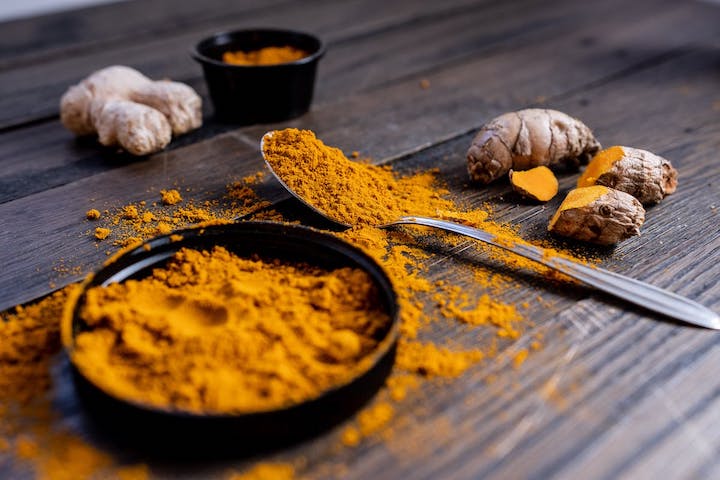How to Beat Anxiety Using Turmeric – and Other Helpful Tips

We all have those anxious days when we feel worried, tense, nervous, or afraid about things that are about to happen or which we think could happen in the future.
Sometimes, you brave the anxiety and go about your day with a smile. Other times, anxiety can be overwhelming and you don't even feel like getting out of bed on some days.
Indeed, anxiety can hit you hard, making your productivity crash. Luckily, simple foods like turmeric can calm you down and beat the anxiety even on your most challenging days.
Benefits of Turmeric for Calming Anxiety

Turmeric is one of the most popular spices with great medicinal benefits. Some people find it genuinely effective for various health treatments, including soothing nervous jitters, anxiety, and certain mental health issues like depression.
Turmeric contains curcumin, a compound rich in antioxidants and powerful anti-inflammatory properties that help eliminate toxins and free radicals from your body. Curcumin exerts helpful antioxidant, anti-inflammatory, antidiabetic, and even anticancer properties in humans.
Moreover, turmeric curcumin breaks through the brain's blood barrier and helps provide energy to the cells. This helps to prevent early brain aging and strengthens the neurological response. This may explain why some people who consistently take turmeric have a better attention span.
Meanwhile, people who take turmeric at night feel calmer and sleep better. It helps in generating body warmth and relaxing you after a long day. When you sleep better and have adequate night’s rest, your body can handle your daily life stressors better and more calmly.
While turmeric may help to relieve your anxiety and make you feel calmer, you should seek professional help in severe cases and take prescribed medications to cure anxiety.
Limitations of Turmeric for Calming Anxiety
While taking turmeric—which contains about 5% curcumin—and the best turmeric supplements can help to ease your anxiety, jitters, and nervousness, it does not work every time.
Ingesting curcumin by itself does not bring the associated health benefits because of its poor bioavailability, which is mainly due to poor absorption, rapid metabolism, and rapid elimination.
However, you can improve the bioavailability of curcumin by including known bioavailability enhancer food agents in your turmeric. For example, piperine is the major active component of black pepper that is associated with an increase of 2000% in the bioavailability of curcumin.
Other ways to increase the bioavailability of curcumin is to consume this spice with a source of fat (such as nuts, nut butters, and avocado). Adding vegetable/seed oils, whole or reduced-fat milk, or yogurt will also provide fats that can enhance curcumin absorption.
Heating a solution of curcumin/turmeric in water to boiling for 10 minutes can also increase the solubility of curcumin 12-fold and that of turmeric 3-fold.
Other Simple Ways and Natural Tips to Calm Anxiety

Here are some more tips to calm anxiety:
I. Leverage the Power of Breathing
Sometimes, all we need is to take deep breaths to calm our worries and anxiety and bring the focus back to where it should be.
In a situation where you feel your anxiety kicking in, remember to take slow, deep breathes to calm yourself down. If you feel anxious before a meeting or presentation, close your eyes and take deep breaths. It helps you momentarily forget about the situation, bringing your mind to peace.
You can also close your eyes and count to ten backwards. It can help to calm you down and ease the anxiety.
II. Avoid Taking Too Much Caffeine
While coffee is good (it keeps you awake and gets you going on days when you haven't had enough sleep), it can trigger anxiety. You won't get anxiety directly from caffeine, but drinking coffee can make anxiety symptoms worse.
Too much caffeine energizes your brain and can push any negative thoughts, worries, and anxiety you may have into overdrive.
Instead, you can have other drinks such as matcha tea or green tea to get a mild caffeine kick.
III. Sleep Solves Most Issues
Lack of sleep makes us cranky and triggers our anxiety. But on days when you get good sleep, you feel more energetic and in a good mood. You’ll also have more energy to deal with any negative thoughts and anxiety you may have when you have quality sleep and are well-rested.
Prioritize sleep in your daily routine, and strive to enhance its quality. You can drink a hot glass of milk, take a warm bath, or spray lavender mist to induce better quality sleep.
Also avoid taking a heavy and spicy meal before bed as it can deteriorate your sleep quality. Instead have lighter meals and have a dedicated bedtime routine to relax your mind and body.
IV. Spend Time with Positive-Minded People
People around you greatly impact how you feel, and they can trigger your worry and anxiety.
If you spend time with overly negative people who radiate bad energy, doom, and gloom, you will surely feel low and can suffer heavy bouts of worry and anxiety.
Surround yourself with positive people and give your time to those who inspire and make you feel genuinely good about yourself and the future. This is far better for your health and overall well-being than hanging around negative people all the time.




































